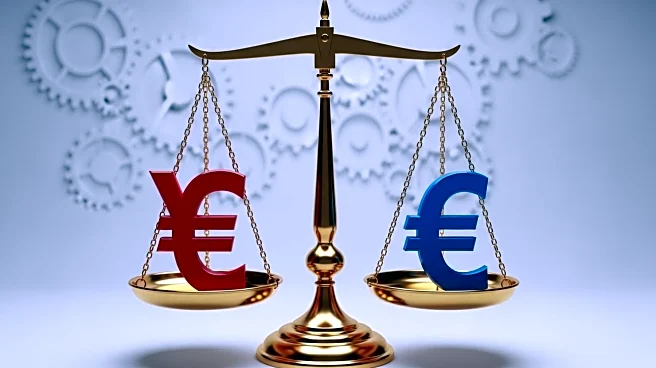What is the story about?
What's Happening?
The People's Bank of China (PBOC) has set the official yuan midpoint at 7.1007 per dollar, marking its strongest level since November 6, 2024. This adjustment comes amidst ongoing trade tensions between Beijing and Washington. The new midpoint rate is 203 pips firmer than a Reuters estimate of 7.1210, indicating a strategic move by the PBOC to stabilize the yuan. Market participants have interpreted this firmer-than-expected fix as an official attempt to maintain currency stability, reflecting China's response to external economic pressures.
Why It's Important?
The strengthening of the yuan midpoint by the PBOC is significant as it reflects China's efforts to manage its currency amidst international trade disputes. A stable yuan can help mitigate the impact of trade tensions on China's economy, potentially influencing global markets and trade dynamics. This move may affect U.S. businesses engaged in trade with China, as currency fluctuations can impact pricing and competitiveness. Additionally, it signals China's commitment to maintaining economic stability, which could influence future negotiations and economic policies between the two nations.
What's Next?
The adjustment in the yuan midpoint may lead to further strategic economic measures by China to counteract trade tensions. Stakeholders, including U.S. businesses and policymakers, will likely monitor these developments closely to assess potential impacts on trade relations and economic strategies. Future negotiations between Beijing and Washington could be influenced by China's currency management, potentially affecting tariffs, trade agreements, and economic policies. The global financial community will also watch for any ripple effects in currency markets and international trade.
Beyond the Headlines
The PBOC's decision to strengthen the yuan midpoint highlights the broader geopolitical and economic strategies at play. It underscores the importance of currency management in international relations and economic stability. This move may also reflect China's long-term strategy to assert its economic influence globally, potentially reshaping trade dynamics and financial markets. The ethical and legal dimensions of currency manipulation could become a topic of discussion among international policymakers, influencing future economic governance frameworks.















